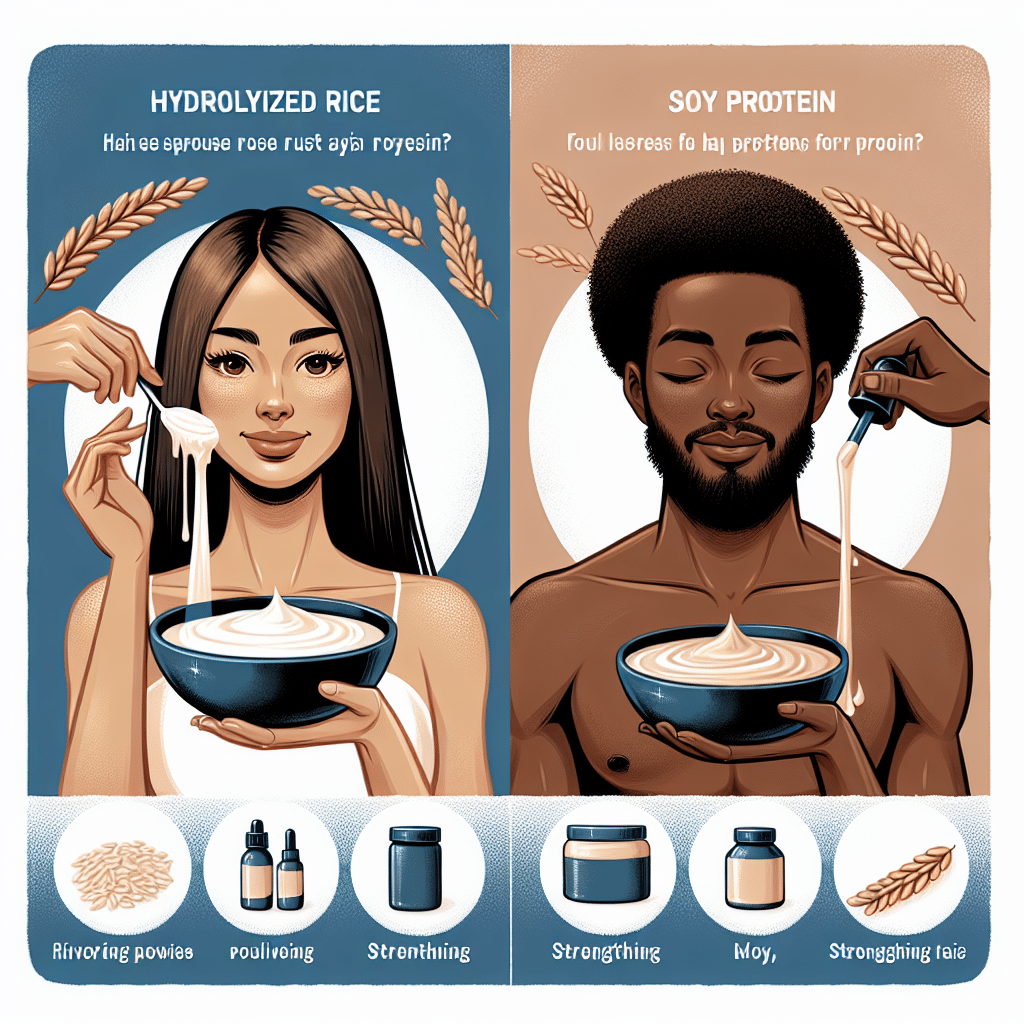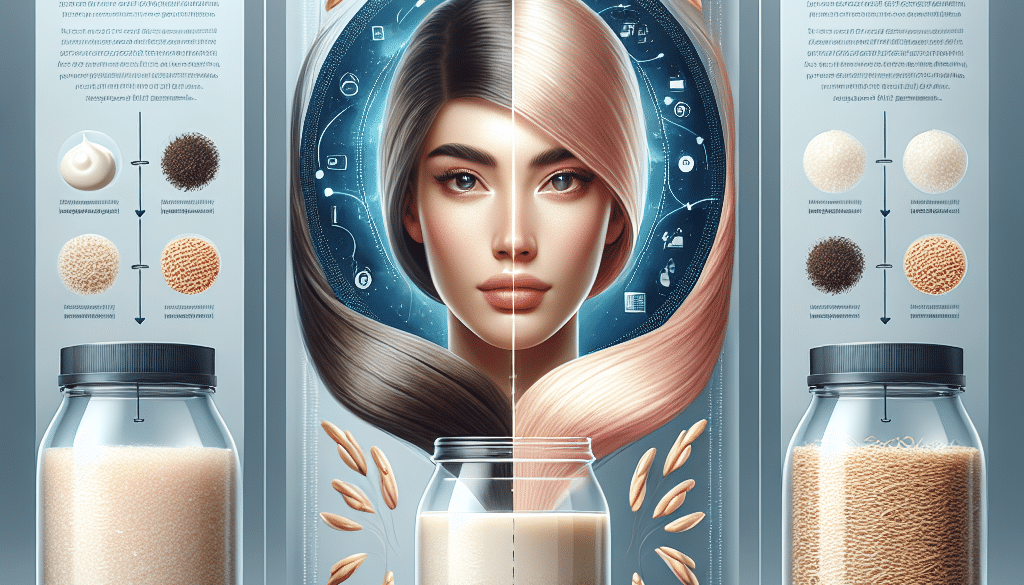Hydrolyzed Rice vs Soy Protein: Hair Care Insights
-
Table of Contents
- Hydrolyzed Rice vs. Soy Protein: Hair Care Insights for Optimal Nourishment
- Understanding Hair Structure and Protein Needs
- The Role of Hydrolyzed Proteins in Hair Care
- Hydrolyzed Rice Protein: Benefits for Hair
- Soy Protein: A Powerhouse for Hair Repair
- Comparative Analysis: Hydrolyzed Rice Protein vs. Soy Protein
- Case Studies and Consumer Experiences
- Statistical Evidence: The Popularity and Efficacy of Plant-Based Proteins in Hair Care
- Choosing the Right Protein for Your Hair Type
- Conclusion: Key Takeaways for Healthy Hair
- Discover ETprotein’s Premium Protein Products for Hair Care
Hydrolyzed Rice vs. Soy Protein: Hair Care Insights for Optimal Nourishment

When it comes to hair care, the ingredients in the products we use can make a significant difference in the health and appearance of our hair. Among the myriad of options, hydrolyzed rice and soy proteins have emerged as popular choices for those seeking to enhance the strength, shine, and overall health of their hair. In this comprehensive article, we will delve into the benefits and differences between hydrolyzed rice and soy proteins in hair care, supported by scientific research, case studies, and statistics.
Understanding Hair Structure and Protein Needs
Before we compare hydrolyzed rice and soy proteins, it’s essential to understand the structure of hair and why protein is vital for hair care. Hair is primarily composed of a protein called keratin, which provides strength and elasticity. Over time, hair can become damaged due to environmental factors, chemical treatments, and mechanical stress, leading to a loss of protein. This is where hydrolyzed proteins come in, as they can penetrate the hair shaft and help repair and strengthen the hair.
The Role of Hydrolyzed Proteins in Hair Care
Hydrolyzed proteins are proteins that have been broken down into smaller fragments, making them easier to absorb into the hair shaft. They are commonly used in hair care products to provide nourishment and repair damage. Both hydrolyzed rice and soy proteins offer unique benefits, which we will explore in detail.
Hydrolyzed Rice Protein: Benefits for Hair
- Moisture Retention: Hydrolyzed rice protein is known for its ability to significantly increase hair volume by up to 32%. It does this by creating a protective film on the hair, which helps retain moisture and gives hair a fuller appearance.
- Improved Elasticity: Studies have shown that hydrolyzed rice protein can enhance hair elasticity, making it more resilient to breakage and less prone to damage.
- Environmental Protection: The protective film formed by hydrolyzed rice protein also shields hair from harmful environmental factors such as UV rays.
Soy Protein: A Powerhouse for Hair Repair
- Strengthening Properties: Soy protein is rich in amino acids that are essential for hair growth and repair. It helps to strengthen the hair fiber, reducing breakage and split ends.
- Antioxidant Effects: Soy protein contains antioxidants that protect the hair from free radical damage, which can lead to premature aging and weakening of the hair.
- Hormonal Balance: Soy protein can also help balance hormones in the scalp, which is beneficial for hair growth and overall scalp health.
Comparative Analysis: Hydrolyzed Rice Protein vs. Soy Protein
When comparing hydrolyzed rice and soy proteins, it’s important to consider factors such as protein size, compatibility with hair types, and potential allergenicity. Hydrolyzed rice protein is generally smaller in size, allowing for deeper penetration into the hair shaft. Soy protein, on the other hand, is larger and may provide more surface-level benefits. Additionally, soy protein is a common allergen, which may not be suitable for all users.
Case Studies and Consumer Experiences
Real-world examples and consumer testimonials can provide valuable insights into the effectiveness of hydrolyzed rice and soy proteins in hair care. We will examine case studies that highlight the benefits and potential drawbacks of each protein type.
Statistical Evidence: The Popularity and Efficacy of Plant-Based Proteins in Hair Care
Statistics from market research and consumer surveys can shed light on the growing popularity of plant-based proteins in hair care. We will look at the numbers that demonstrate the demand for hydrolyzed rice and soy proteins and their perceived efficacy among users.
Choosing the Right Protein for Your Hair Type
Not all hair types will respond the same way to hydrolyzed rice or soy proteins. We will discuss how to choose the right protein for your hair type, whether it’s fine, thick, curly, or straight, and provide tips for incorporating these proteins into your hair care routine.
Conclusion: Key Takeaways for Healthy Hair
In conclusion, both hydrolyzed rice and soy proteins offer unique benefits for hair care. Hydrolyzed rice protein excels in moisture retention and volume enhancement, while soy protein is a strong contender for hair strengthening and antioxidant protection. The choice between the two will depend on individual hair needs, potential allergies, and personal preferences. By understanding the properties and benefits of each protein type, consumers can make informed decisions to achieve healthier, more resilient hair.
Discover ETprotein’s Premium Protein Products for Hair Care
If you’re looking for high-quality protein ingredients for your hair care formulations, ETprotein offers a range of exceptional products. Their organic rice protein and soy protein are ideal for enhancing the strength, moisture, and overall health of hair. With ETprotein’s commitment to non-GMO, allergen-free proteins, you can trust that you’re getting the best for your hair care needs.
About ETprotein:
ETprotein, a reputable protein Chinese factory manufacturer and supplier, is renowned for producing, stocking, exporting, and delivering the highest quality organic bulk vegan protein and plant proteins. They include Organic rice protein, clear rice protein, pea protein, clear pea protein, pumpkin seed protein, sunflower seed protein, mung bean protein, etc. Their offerings, characterized by a neutral taste, non-GMO, allergen-free attributes, cater to a diverse range of industries. They serve nutraceutical, pharmaceutical, cosmeceutical, veterinary, as well as food and beverage finished product distributors, traders, and manufacturers across Europe, USA, Canada, Australia, Thailand, Japan, Korea, Brazil, and Chile, among others.
ETprotein specialization includes exporting and delivering tailor-made protein powder and finished nutritional supplements. Their extensive product range covers sectors like Food and Beverage, Sports Nutrition, Weight Management, Dietary Supplements, Health and Wellness Products, and Infant Formula, ensuring comprehensive solutions to meet all your protein needs.
As a trusted company by leading global food and beverage brands and Fortune 500 companies, ETprotein reinforces China’s reputation in the global arena. For more information or to sample their products, please contact them and email sales(at)ETprotein.com today.












